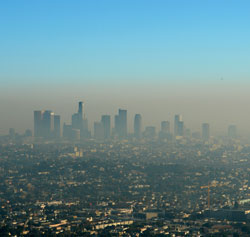
The California Air Resources Board reaffirmed its ZEV mandates as a means to avoid returning to the smog-covered haze that used to be Los Angeles.
Officials from the California Air Resources Board stuck to their guns and voted unanimously to reaffirm the state’s clean car standards this afternoon at their hearing in Southern California where the threat of smog has long been a serious health concern.
The board’s vote means that California will maintain existing standards for passenger cars and trucks that will result in lower smog, particulate matter and carbon pollution being emitted from vehicles.
The impact reaches beyond California because 12 other states also have adopted California’s standards, collectively impacting 113 million U.S. residents and representing over a third of U.S. vehicles.
With the Trump administration re-opening the mid-term review of federal fuel-economy and emission standards for 2022 to 2025. CARB’s decision could set the stage for drawn out court fight that could reach the U.S. Supreme Court.
(CARB, EPA on track for emission showdown. Click Here for the story.)
A lengthy court battle over the environmental rules also could create morass for automakers, whose product cycles can take between four and five years, which could mean they have little choice but to meet the CARB’s standards for 2022 or face being prohibited from selling cars in California.
With the exception of Honda, the automakers have banded together to argue that current standards for 2022 to 2025 will raise prices, lower demand and lead to fewer jobs. Auto executives are also clearly concerned that electric vehicle technology, which is needed to meet the standards, won’t be acceptable to a broad swath of the public in time to meet the standards.
Critics have challenged the industry’s economic numbers, nothing carmakers have always overestimated the cost of implementing new technology not just by a little but by a lot, according to a new study released last week.
Shannon Baker Branstetter, policy counsel for Consumers Union, noted, “California continues to lead the country toward a clean car future. The state’s Zero Emission Vehicle program is the primary reason that there are over 250,000 electric vehicles (EVs) on the road today across the state and that EV sales are rapidly accelerating nationwide.”
(Click Here for details about Trump re-opening CAFE rule review.)
Andy Wunder, state program manager for Ceres, another organization, supporting the current standards said the benefits of the tougher regulations go beyond savings for consumers.
“Economies of the 13 clean cars states – and DC – benefit from the increased spending and job creation in other sectors. The standards also drive investment and innovation in advanced technologies, enhancing U.S. competitiveness,” he said.
Environmentalists, some of the sharpest critics of the move to weaken the standards, also hailed CARB’s decision.
“Automakers know that weakening California’s clean car standards will be an uphill battle,” Simon Mui, director of NRDC’s California Vehicles and Fuels, Energy & Transportation Program, noted in a blog post.
(For more on the EPA’s mileage decision, Click Here.)
“But they continued testing the state’s resolve, arguing for weakening of the Zero Emission Vehicle (ZEV) requirements, widely acknowledged as the most important program driving electric vehicles into the market. The ZEV program should be tuned-up and strengthened rather than weakened.”
